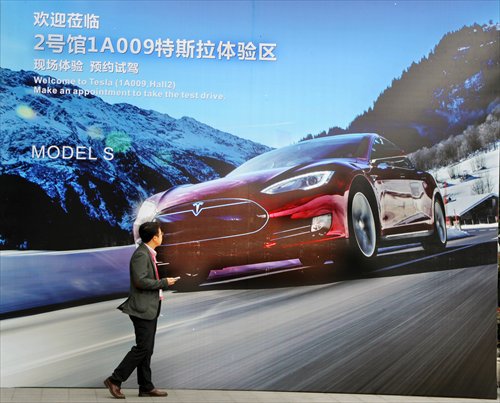HOME >> BUSINESS, METRO BEIJING
Tesla struggles to maintain speed
Source:Global Times Published: 2015-1-29 17:38:01

Tesla's electric cars cost Chinese consumers nearly double what US buyers pay. Photo: CFP
Tesla's Vice President of Communications June Jin expressed optimism regarding the success of the electric car company in the Chinese market at the Global New Energy Vehicle Conference (GNEV) in Tianjin on January 24.Tesla developed its business quickly in China, establishing nine experiential stores in six major cities, including Beijing, Shanghai and Shenzhen in Guangdong Province in less than a year. The company is also building 400 free charging stations across China.
However, Tesla's business performance as of late hasn't hit high marks. Tesla's mission was to sell between 460,000 and 480,000 vehicles worldwide in 2014, with 140,000 to 170,000 sales coming from China. Yet, in the first 10 months of 2014, the company exported about 4,000 vehicles to China, and only 1,600 of them have been registered for use.
Tesla's share price also declined 13 percent early this month, according to a report in CBN Weekly published on January 26.
Bloomberg News said on January 14, that Tesla CEO Elon Musk described the Chinese market as a "wild card."
"China makes up a small percentage of our sales right now," Musk said at a recent talk in Detroit, according to a CNN report on January 14. "Things were a little weaker in China because of communication issues. There was a misconception that charging was difficult in China."
Tesla was also experiencing issues with sales around the world. Last year, cold weather in Norway, the second largest market after the US for Tesla's Model S, caused problems for its electric grid and thus affected Model S sales, according to hybrid vehicles news website hybridcars.com. In June 2014, Tesla's deliveries to Norway dropped by 47 percent. Consequently, Tesla hopes to rely on the Chinese market to meet its sales goals.
Analysts said several factors caused such a drop in sales, including defective recharging grids and batteries, the lack of recharging stations, the lack of consumer understanding and recognition about electric vehicles and inadequate service. A main factor for the low sales in the Chinese market particularly is the comparatively high prices.
Jin said at GNEV that they expected to make their electric vehicles affordable to ordinary consumers in China. Nevertheless, there is a huge gap in price for Tesla's vehicles in the Chinese market compared with the US and other Western countries.
Currently, Tesla's Model S is about $49,900 after US federal tax credits in the US, while in China, it costs $103,715. High tariff and transport costs are the cause of the price gap. Vehicles China imports are taxed a 25 percent tariff rate, a 17 percent value-added tax, and a consumption tax that depends on the vehicle's emissions.
Posted in: Press Release, Enterprise